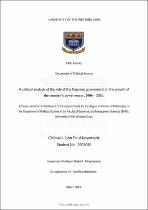| dc.contributor.advisor | Mngomezulu, Bheki. R | |
| dc.contributor.advisor | Matshanda, Namhla | |
| dc.contributor.author | Igwemezie, Chibuzo John Paul | |
| dc.date.accessioned | 2023-11-10T09:50:11Z | |
| dc.date.available | 2023-11-10T09:50:11Z | |
| dc.date.issued | 2023 | |
| dc.identifier.uri | http://hdl.handle.net/11394/10514 | |
| dc.description | Philosophiae Doctor - PhD | en_US |
| dc.description.abstract | The Nigerian power sector has been experiencing various challenges in the past few decades. Some of the challenges include constant blackouts or load-shedding, old and out-dated equipment, lack of infrastructures, insufficient funding, and inadequate technical knowledge to tackle the issues the sector is experiencing. This has greatly affected the entire country as more than 50 percent of its population does not have access to electricity, while those with access are constantly faced with continuous power failure and outages. There was a steady growth in the power sector after the country’s independence in October 1960. Many expected that to continue. Unfortunately, the opposite happened. This has greatly affected the living standards and the country’s economy negatively. Inevitably, this situation has had an impact on the country’s politics too. | en_US |
| dc.language.iso | en | en_US |
| dc.publisher | University of the Western CapeUniversity of the Western Cape | en_US |
| dc.subject | Nigeria | en_US |
| dc.subject | Analysis | en_US |
| dc.subject | Government | en_US |
| dc.subject | Electricity | en_US |
| dc.subject | Growth | en_US |
| dc.subject | Energy | en_US |
| dc.title | A critical analysis of the role of the Nigerian government on the growth of the country’s power sector, 2006 – 2016 | en_US |
| dc.rights.holder | University of the Western Cape | en_US |

